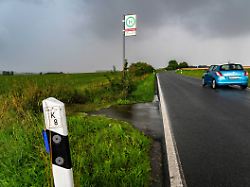“Alarming” need for renovation
That’s how it is with Germany’s country roads
8/30/2023, 1:18 p.m
A study structural condition of all roads in the municipalities not in good condition. Associations are therefore calling for a transport plan for Germany that does not think in terms of legislative periods. However, the financial cost would be enormous.
A large number of roads, rails and bridges in the municipalities and districts will have to be renovated in the coming years. According to a study by the German Institute for Urban Studies, the investment required to maintain and expand the municipal transport network by 2030 is around 372 billion euros. Almost every second road bridge is not in good condition and there are also clear deficits in the public transport networks. A third of the roads have “major defects”.
The institute prepared the study on behalf of the Association of German Transport Companies (VDV), the Main Association of the German Construction Industry and the ADAC. The results show “an alarming picture of the state of the municipal transport infrastructure,” explained VDV general manager Oliver Wolff. A traffic plan for Germany is needed “that doesn’t think in terms of legislative periods and regional responsibilities, but rather enables nationwide traffic,” added construction industry director Tim-Oliver Müller.
According to the study, the lion’s share, at around 283 billion euros, is accounted for by the need to catch up and replace the local authorities’ road infrastructure. Investments of 64 billion euros would be required for the public transport infrastructure.
Subsidies for municipalities will soon no longer be sufficient
“We have always emphasized that the targeted increase in passenger numbers and the shift to public transport will only work in the long term if the offer is attractive enough for people,” explained Wolff. The annual federal funding for municipalities will no longer be sufficient from 2025 because more and more projects are being registered. The VDV considers an increase from two to three billion euros a year to be necessary.
Criticism of the federal government’s transport policy came from the Pro-Rail Alliance, the General German Bicycle Club (ADFC) and the Auto Club Europa (ACE). The three associations checked to what extent the projects from the coalition agreement had already been implemented and awarded a grade of four overall. For the second half of the legislative period, the associations called for outstanding projects to be implemented more quickly.
The associations graded individual areas differently: there was a grade of two for more investment in rail than in road, but only a four for less funding for cycling. The government even got a five when it came to reducing subsidies that were harmful to the environment and the climate. When it comes to the expansion of the charging infrastructure for e-cars, the coalition does poorly in the assessment of the three associations.
